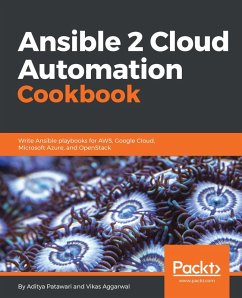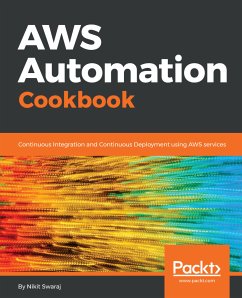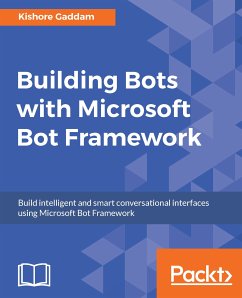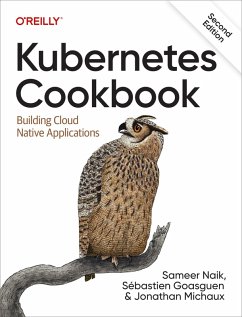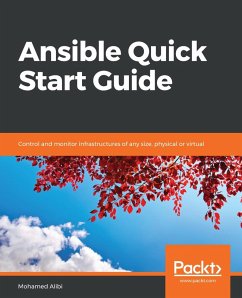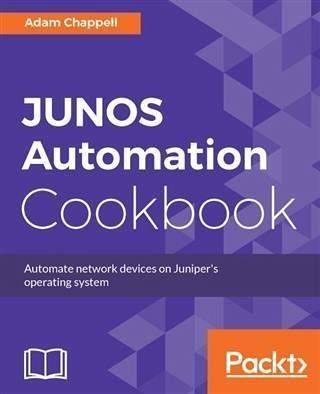
JUNOS Automation Cookbook (eBook, ePUB)
Versandkostenfrei!
Sofort per Download lieferbar
38,95 €
inkl. MwSt.
Weitere Ausgaben:

PAYBACK Punkte
19 °P sammeln!
Administer, configure, and monitor Junos in your organization About This Book Get well acquainted with security and routing policies to identify the use of firewall filters. Learn to provide end-user authentication and protect each layer in an enterprise network. A recipe-based guide that will help you configure and monitor Junos OS and basic device operations. Who This Book Is ForThis book targets network engineers, developers, support personals, and administrators who are working on devices running Junos OS and are looking at automating their organisation's operations. Some understanding a...
Administer, configure, and monitor Junos in your organization
About This Book
This book targets network engineers, developers, support personals, and administrators who are working on devices running Junos OS and are looking at automating their organisation's operations. Some understanding about Junos would be necessary
What You Will Learn
The JUNOS Automation Cookbook is a companion guide for the complex field of automating tasks on JUNOS devices. With a foundation in industry-standrd XML, JUNOS provides an ideal environment for programmatic interation, allowing you to build upon the capabilities provided by Juniper, with your own original code.
You will begin by learning about, and setting up, the industry-standard NETCONF remote procedure call mechanisms on your device. After initial setup, you'll walk through SLAX - Juniper's foundation scripting language - for manipulating XML representations of JUNOS concepts and elements. You'll learn how to write your own SLAX scripts to customise the operating environment, and also how to write proactive event handlers that deal with situations as they happen.
You'll then delve into PyEZ - Juniper's bridging framework to make automation accessible to Python code - allowing you to build automation applications in the popular scripting language. You'll witness some examples of how to write applications that can monitor configuration changes, implement BGP security policies and implement ad-hoc routing protocols, for those really tricky situations. You'll also leaarn how asynchronous I/O frameworks like Node.js can be used to implement automation applications that present an acceptable web interface.
Along with way, you'll explore how to make use of the latest RESTful APIs that JUNOS provides, how to visualize aspects of your JUNOS network, and how to integrate your automation capabilities with enterprise-wide orchestration systems like Ansible.
By the end of the book, you'll be able to tackle JUNOS automation challenges with confidence and understanding, and without hassle.
Style and Approach
A guide that will cover all the automation tools along with steps on leveraging these tools
About This Book
- Get well acquainted with security and routing policies to identify the use of firewall filters.
- Learn to provide end-user authentication and protect each layer in an enterprise network.
- A recipe-based guide that will help you configure and monitor Junos OS and basic device operations.
This book targets network engineers, developers, support personals, and administrators who are working on devices running Junos OS and are looking at automating their organisation's operations. Some understanding about Junos would be necessary
What You Will Learn
- Start using NETCONF RPC standard and understand its usefulness in programming JUNOS
- Write SLAX scripts to respond to events in the JUNOS environment
- Automate JUNOS with PyEZ
- Deal with events in the JUNOS environment, and writing response handlers to deal with them
- Make the most of automation technologies to help with maintenance and monitoring of JUNOS
- Use the Ansible framework to extend the automation functionality of Junos
The JUNOS Automation Cookbook is a companion guide for the complex field of automating tasks on JUNOS devices. With a foundation in industry-standrd XML, JUNOS provides an ideal environment for programmatic interation, allowing you to build upon the capabilities provided by Juniper, with your own original code.
You will begin by learning about, and setting up, the industry-standard NETCONF remote procedure call mechanisms on your device. After initial setup, you'll walk through SLAX - Juniper's foundation scripting language - for manipulating XML representations of JUNOS concepts and elements. You'll learn how to write your own SLAX scripts to customise the operating environment, and also how to write proactive event handlers that deal with situations as they happen.
You'll then delve into PyEZ - Juniper's bridging framework to make automation accessible to Python code - allowing you to build automation applications in the popular scripting language. You'll witness some examples of how to write applications that can monitor configuration changes, implement BGP security policies and implement ad-hoc routing protocols, for those really tricky situations. You'll also leaarn how asynchronous I/O frameworks like Node.js can be used to implement automation applications that present an acceptable web interface.
Along with way, you'll explore how to make use of the latest RESTful APIs that JUNOS provides, how to visualize aspects of your JUNOS network, and how to integrate your automation capabilities with enterprise-wide orchestration systems like Ansible.
By the end of the book, you'll be able to tackle JUNOS automation challenges with confidence and understanding, and without hassle.
Style and Approach
A guide that will cover all the automation tools along with steps on leveraging these tools
Dieser Download kann aus rechtlichen Gründen nur mit Rechnungsadresse in A, B, BG, CY, CZ, D, DK, EW, E, FIN, F, GR, HR, H, IRL, I, LT, L, LR, M, NL, PL, P, R, S, SLO, SK ausgeliefert werden.




